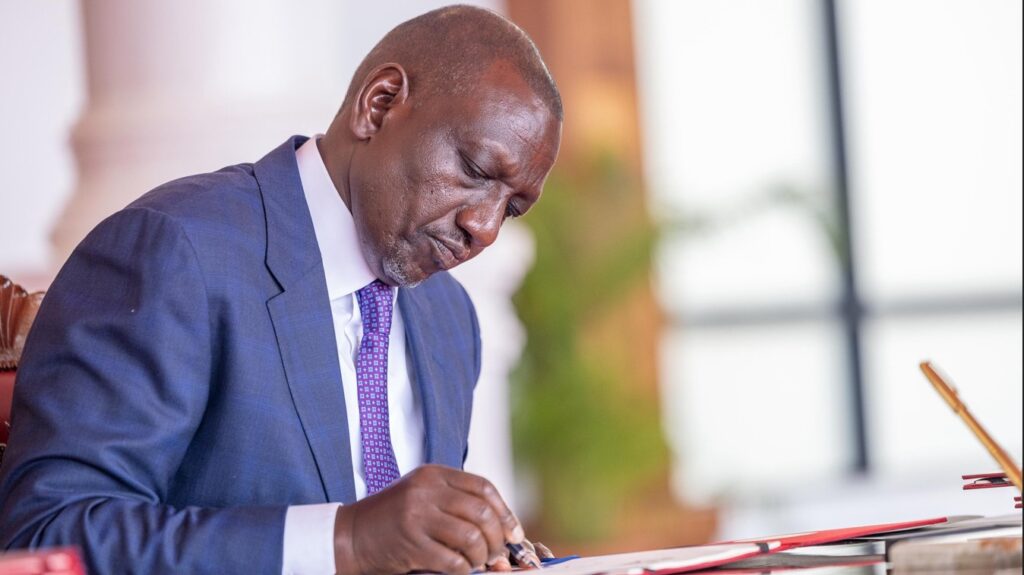Through a notice in the 15th August edition of the Kenya Gazette, President William Samoei Ruto kicked off the process to appoint the third cohort of commissioners to the National Land Commission. Through Gazette Notice No 11212, the President appointed a selection panel of seven members drawn from diverse institutions in conformity with the law. The seven appointees represent diverse institutions as set out in the National Land Commission (NLC) Act.
Panel members
These are Jasper Micheni Mbiuki, representing the Office of the President and Dr C.K Mang’ira, representing the Lands Cabinet Secretary. Dr Electine Nasambu and Ann Mwangangi represent the Non-Governmental Organisations Council while Bibiana Rabuku Omalla represents the Kenya Private Sector Alliance. The Association of Professional Societies in East Africa (APSEA), the umbrella body of Kenya’s professional associations nominated Prof Nichola Letting to the panel. The seventh member, Hon Rehema Dida Jaldesa, is a nominee of the National Gender and Equality Commission. The NLC Act provides that the members of the selection panel shall elect a chairperson from among them during their first sitting.
It would appear that the members elected Hon Rehema Dida Jaldesa to be their chairperson, given that she was signatory to the advertisement released through the Daily Nation dated August 27th, 2025 calling for applications for the chairperson and members of the National Land Commission. These applications should be received by the panel on or before 5.00pm on Tuesday 16th September, 2025. The details are available on the X handle of the Public Service Commission (see https://x.com/PSCKenya/status/1961360705904390275)
Previous lessons
The tenure of the current cohort of commissioners, who were appointed on 15th November, 2019, comes to an end on 14th November, 2025. So why would the President appoint a selection panel while the tenure of the current commissioners is yet to expire? Lessons! The lessons learnt from the previous transition were harsh. The pioneer team of land commissioners left office in February 2019, after serving a non-renewable six-year term. As noted above, it was replaced in November 2019. There was hence a nine-month lacuna. Over this period, Kenya spent huge resources paying technical and administrative officers who could not make policy decisions or execute programs that needed policy endorsement. Consequently, many national projects, particularly public physical infrastructure projects such as roads, dams and houses that required compulsory acquisition of land, suffered huge delays. If done seamlessly, the selection process should take about three months. From experience though, it spills over way beyond this. But the early start helps to reduce the gap.
Concerns over unexpired tenure
For the reason, I suppose that the Presidency is much wiser this time round, and has put in motion a replacement process way before the current commissioners sign off. President Ruto’s notice carefully states that the notice is “in respect of the impending vacancies in the membership of the Commission, which will arise from the lapse of the six-year non-renewable term of the current members with effect from 14th November, 2025”. I suppose that this is intended to pre-empt consequential legal concerns. But there will be some, nonetheless. Two commissioners, Hon Esther Murugi and Hon Tiyah Galgalo, took office a year late, since court cases debarred the commencement of their terms. These two were sworn into office on 21st November, 2020. Their six-year terms therefore come to an end on 20th November, 2026. Would they forego this one year and exit along with others? Would this be the prudent way to go? Opinion is split.
Sticklers to the law observe that they must be left to serve their full terms. And if so denied, they should assert the right through the court. They further observe that the two would help to transition historical memory. On the other hand, pragmatists point out that this would be yet another waste of public resources. Why? Because, until the appointment of the next cohort, the two commissioners would be alone and would have no authority to make policy decisions since the desirable quorum is three. Moreover, the process to appoint the new set of commissioners observes a regional, gender and skills diversity. A two-phase appointment process, which would be unprecedented for this commission, would constrain the observance of this diversity, and duplicate costs. Their presence within a new team may also be deemed obstructive to a fresh start. Others advise a negotiated settlement.
The government may wish to negotiate with the two and seek some middle-ground, minimize loss of public resources and respect the constitutional rights of the two.
Ibrahim Mwathane(Consultant on land governance: mwathane@landsca.co.ke)
Dated: 30th August, 2025

